Moon by 2024 no more? NASA's Artemis deadline for crewed lunar landings likely to relax under Biden

NASA's quest to put boots back on the moon will likely get less urgent after President-elect Joe Biden takes office next month.
Through its Artemis program, the space agency has been working to land two astronauts, including the first-ever female moonwalker, near the lunar south pole by 2024. That ambitious deadline, which was announced by Vice President Mike Pence in 2019, will likely be relaxed under the Biden administration, experts say.
"I expect the 2024 goal to go away," space policy expert John Logsdon, a professor emeritus of political science and international affairs at George Washington University's Elliott School of International Affairs in Washington, D.C., told Space.com.
Related: Presidential visions for space: From Ike to Trump
Eric Stallmer, executive vice president of government affairs and public policy at Voyager Space Holdings, agreed with that assessment.
"I think people will reassess the timeline for sure," Stallmer, who served as president of the Commercial Spaceflight Federation from 2014 until this autumn, told Space.com. "And, candidly, I don't think anyone thought that 2024 timeline was realistic. It was ambitious and aspirational, but I don't think realistic."
That doesn't mean Artemis itself will get the axe, however. Indeed, both Logsdon and Stallmer think the program and its long-term goals — establishing a sustainable presence on and around the moon, and using such efforts to prepare for crewed missions to Mars — will remain on firm footing after Biden takes office.
Breaking space news, the latest updates on rocket launches, skywatching events and more!
The president-elect hasn't said much publicly about NASA or space exploration to date. However, Logsdon pointed to the Democratic Party's official 2020 platform, stressing that it's "very bullish on human exploration."
And the platform explicitly endorses the broad Artemis vision: "We support NASA's work to return Americans to the moon and go beyond to Mars, taking the next step in exploring our solar system."
Human space exploration also seems to enjoy wide support, both on Capitol Hill and throughout the country.
"At least among the attentive public, there's a pretty firm consensus that it's time to start exploration, and that the moon is the appropriate first destination," Logsdon said.
Related: President-elect Biden selects eight-person NASA transition team
Tweaks to the Artemis timeline, should they indeed occur, won't be the only changes the Biden administration makes in the realms of space policy, science and exploration. For example, the 2020 Democratic Party platform, which you can read here, voices a strong commitment to Earth science and the fight against climate change: "Democrats additionally support strengthening NASA and the National Oceanic and Atmospheric Administration’s Earth-observation missions to better understand how climate change is impacting our home planet."
And these probably won't just be empty words under a Biden administration.
"I think it's entirely likely that NASA will be given a prominent role in the global climate change effort, which Biden has said will be one of his top priorities," Logsdon said.
That would represent a marked departure from the Trump administration's priorities. The president withdrew the U.S. from the Paris Climate Accord, for instance, and White House budget requests during his term have repeatedly sought to cancel NASA Earth science missions (though Congress has generally restored funding to the targeted projects).
These two postulated changes — delaying the 2024 moon landing and boosting NASA Earth science — may end up working in concert. Spreading Artemis funding out over additional years would free up money that could be routed to Earth science, Stallmer said.
Logsdon also predicted one more shift to come under Biden: "a friendlier approach to multilateral cooperation." The Trump administration has tended to evince less flexibility in the diplomatic realm, Logsdon said, citing the Artemis Accords as an example.
The Accords lay out a set of principles by which nations must abide if they wish to participate in the Artemis program as a partner. These principles, and the Accords themselves, "are more or less fine," Logsdon said.
But they're presented in a sort of take-it-or-leave-it way, he added, "and I know from conversations with some of the local representatives of other countries that that was not appreciated."
Still, he stressed that NASA and the U.S. space program overall appear to be in good shape, a result due in part to the efforts of the policy-shaping National Space Council (NSC). Trump resurrected the NSC early in his term; it had last been active in the early 1990s, during the administration of President George H.W. Bush.
Whether or not Biden will retain the NSC remains to be seen, as do pretty much all the details of his space-policy priorities; all we have for now is speculation. But the overall picture could start coming into clearer focus soon, once Biden announces his pick for NASA Administrator. (The current agency chief, Jim Bridenstine, has said he won't continue in the top job in the Biden administration.)
Biden has made history with his picks for other high-profile government jobs. His nominations include the first African-American for Secretary of Defense (Lloyd Austin); the first woman to head the Treasury Department (Janet Yellen); the first Native American Interior Secretary (Deb Haaland); the first Latino in charge at Homeland Security (Alejandro Mayorkas); the first female Director of National Intelligence (Avril Haines); and the first openly LGBTQ person to serve in any Cabinet post (Pete Buttigieg, Secretary of Transportation).
So maybe NASA will get the first female administrator in its 62-year history. We'll just have to wait and see.
Mike Wall is the author of "Out There" (Grand Central Publishing, 2018; illustrated by Karl Tate), a book about the search for alien life. Follow him on Twitter @michaeldwall. Follow us on Twitter @Spacedotcom or Facebook.

Michael Wall is a Senior Space Writer with Space.com and joined the team in 2010. He primarily covers exoplanets, spaceflight and military space, but has been known to dabble in the space art beat. His book about the search for alien life, "Out There," was published on Nov. 13, 2018. Before becoming a science writer, Michael worked as a herpetologist and wildlife biologist. He has a Ph.D. in evolutionary biology from the University of Sydney, Australia, a bachelor's degree from the University of Arizona, and a graduate certificate in science writing from the University of California, Santa Cruz. To find out what his latest project is, you can follow Michael on Twitter.
